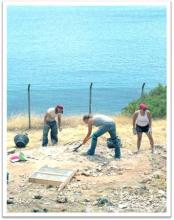This program introduces students to the archaeology, history and culture of Greece through participation in a field school, accompanying seminars, and excursions to major sites and museums in the region, such as Corinth, Perachora, Mycenae, Nemea, Epidauros, and Nafplion. Students will receive instruction in basic field techniques and will participate in seminars run by experts in different fields. The team lodges at a comfortable family-run hotel in Archaia Korinthos, the village that stands today on the ancient site of Corinth, about an hour south of Athens. No previous experience is needed; we are looking for someone with a serious interest in furthering a knowledge of life in ancient Greece, as well as of archaeological techniques.
If you are interested in applying, please fill out the application form below and submit it to the Classics office (#15 Grosvenor House) AC# 2257. Application deadline: March 6, 2017.
The cost of the program, excluding airfare to and from Greece and some weekend meals, is $4,350. Possible sources of funding are available through the AIA Fellowships and Grants page or at Amherst College through the office of Dean Janna Behrens.
We await this year's announcement poster.
Susan Virginia S. Wheeler '13 participated in the program in the summer of 2010. Tim Clark, Andrew Reed, and Ryan Milov, have participated in past summers. Please contact them for more information if you wish. If you have questions, please contact Professor R. Sinos.
